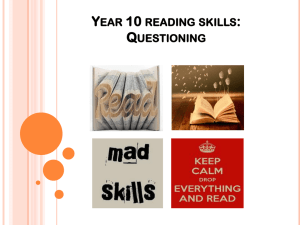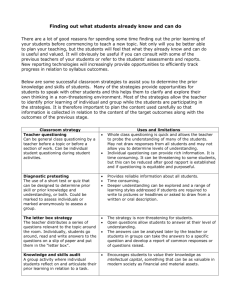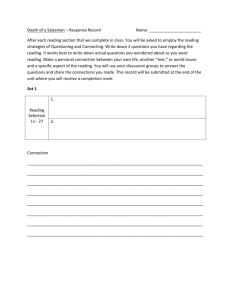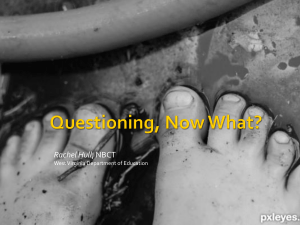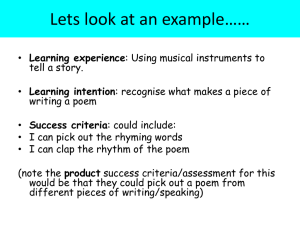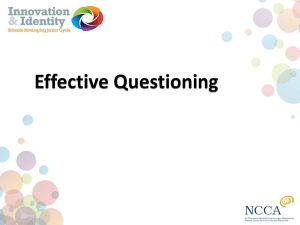The Power and Importance of Questioning Elementary, PK-5
advertisement
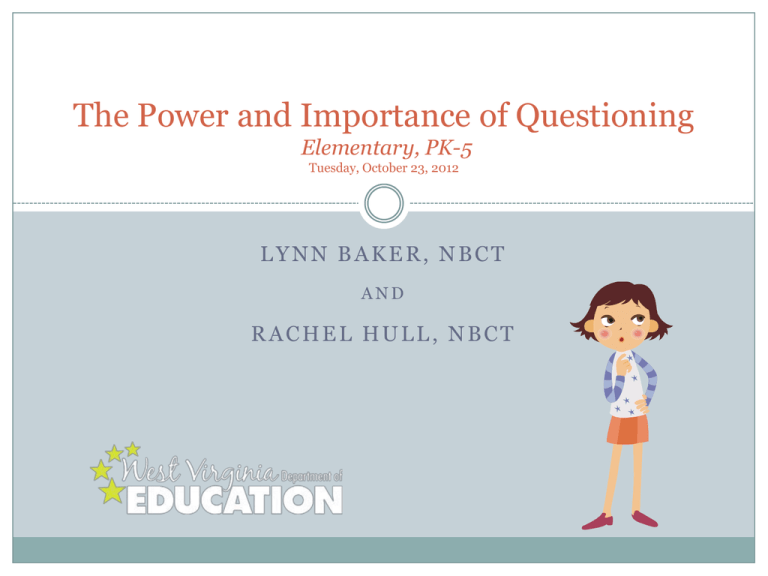
The Power and Importance of Questioning Elementary, PK-5 Tuesday, October 23, 2012 LYNN BAKER, NBCT AND RACHEL HULL, NBCT Warning!! Disclaimer You are adult learners. The activities and strategies shared today are not packaged and ready to implement on Thursday. We have collapsed and combined tasks to illustrate and define a learning sequence that may be weeks long. Today’s Goals Understand the foundational role of questioning in developing understandings in all content areas Begin applying the foundational role of questioning i in all content areas Evaluate how you facilitate questioning in your professional practice Create a plan for school-wide implementation and support Illustration See-Think-Wonder 1. Look carefully at the artwork. What do you notice? What do you think is going on? 2. Now read the text and discuss your understanding of it based on the words and the artwork together. Sentence-that was meaningful to you, that you feel captures a big idea of the text. Phrase-that moved, engaged, or provoked you. Word-that captured your attention or struck you as powerful. Picture #: Sent ence: Phrase: Word: What are the Next Generation Content Standards and Objectives? What evidence do you find that supports the critical role of questioning? Big Number Tasks DEVELOPING AN UNDERSTANDING OF PLACE VALUE Conceptualizing Large Numbers Challenges Physical models for large numbers are not readily available. Textbooks deal with large numbers in a predominantly symbolic manner. Students need references for large numbers. Learning Task Focus on your thought process as you complete the task. A Long Time How long is 1000 seconds? ≈16 ½ minutes How long is a million seconds? ≈16,666 ½ minutes ≈278 hours ≈ 11 ½ days A Time Challenge How long would it take to button a button 1000 times? Collaborate All must understand Record your plan and the justification of your solution on chart paper. A Time Challenge Debrief List questions Discuss the purpose of the questions Next Generation CSOs Cluster Generalize Place Value Understanding for Multi-digit Whole Numbers Objectives Students will M.4.NBT.1 recognize that in a multi-digit whole number, a digit in one place represents ten times what it represents in the place to its right. For example, recognize that 700 ÷ 70 = 10 by applying concepts of place value and division. M.4.NBT.2 read and write multi-digit whole numbers using base-ten numerals, number names and expanded form and compare two multi-digit numbers based on meanings of the digits in each place, using >, = and < symbols to record the results of comparisons. M.4.NBT.3 use place value understanding to round multi-digit whole numbers to any place. Standards for Mathematical Practice 1. 2. 3. 4. 5. 6. 7. 8. Make sense of problems and persevere in solving them Reason abstractly and quantitatively Construct viable arguments and critique the reasoning of others Model with mathematics Use appropriate tools strategically Attend to precision Look for and make use of structure Look for and express regularity in repeated reasoning Mathematical Literacy Document Mathematical Literacy Document Standards for Mathematical Practice Identify phrases of the Standards for Mathematical Practice that relate to questioning. 1. 2. 3. 4. 5. 6. 7. 8. Make sense of problems and persevere in solving them Reason abstractly and quantitatively Construct viable arguments and critique the reasoning of others Model with mathematics Use appropriate tools strategically Attend to precision Look for and make use of structure Look for and express regularity in repeated reasoning Compare/Contrast I think ____ because _______________. Personal practice Homework Homework questions Sort your questions. What kinds/types of questions did you ask? When are these question types best used? Scaffolding My Students ELA Standards Learning Progression Create scaffoldidng plan-start slow Support for colleagues Table Tasks Envelope with directions Roles—Teacher, Administrator, Scribe, Students Opportunity to practice questioning-it’s about STUDENTS making meaning, NOT clarification Create the “best case scenario” as authentically as possible—it’s about the questioning Debrief Take 3-5 minutes to debrief table task Administrator Role Teacher Role Student Role How did questioning deepen student understanding and/or provide evidence of learning? Where/when was questioning difficult? Why? What additional questions could you have asked to make it more meaningful? www.learner.org Planning When and where will you share with your staff? What will you share? How will you purposefully build the collaborative environment necessary to ensure effective questioning is a reality for all? Building the concept—Where do you begin? How will you connect this with the NxGen CSOs? How will you illustrate the critical importance in every content area? How will you illustrate the two roles of questioning? How will you evaluate your training and inform your continued growth and support? WVDE Support Webinar, November 13 at 3:30 Survey WVDE Staff Collecting Evidence This is a daily journey for all! Personal evidence from every team member Local evidence from the school Evidence of student/parent feedback Each team member must be prepared to share evidence at February training. Think social mixer! (speed dating!) Today’s Goals Understand the foundational role of questioning in developing understandings in all content areas Begin applying the foundational role of questioning i in all content areas Evaluate how you facilitate questioning in your professional practice Create a plan for school-wide implementation and support
